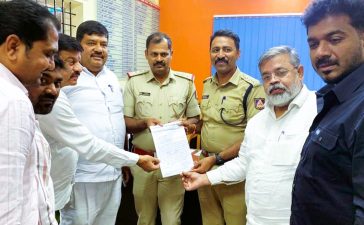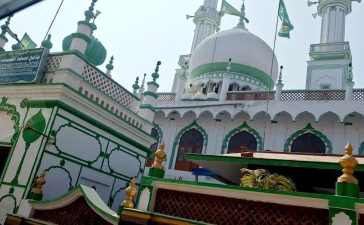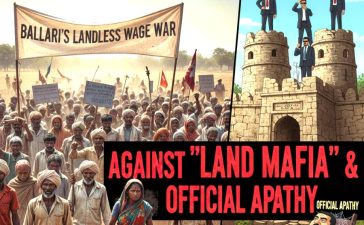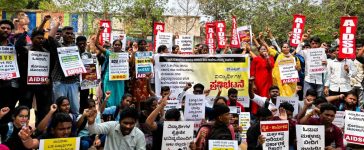Adivasis in Karnataka Demand Rights and Justice on World Indigenous Peoples Day
Convention Highlights Systemic Exploitation, Calls for Urgent Action
Mysuru, August 9, 2025 – On the occasion of World Indigenous Peoples Day, hundreds of Adivasis from across Karnataka gathered at the Ideal Java Rotary School in Mysuru for a convention organized by the Adivasi Sangharsh Morcha. The event highlighted the severe challenges faced by indigenous communities, including land dispossession, economic exploitation, lack of basic amenities, and systemic violence.
The convention began with a solemn tribute to Ponnanna, an 18-year-old Adivasi from Kodagu who was shot dead on December 28, 2024, on suspicion of theft. His death symbolizes the broader struggles of Karnataka’s 50 Scheduled Tribes—including the Jenu Kurubas, Soligas, Hakki Pikkis, and Siddhis—who continue to fight for survival amidst state neglect and corporate exploitation.
Land Rights and Evictions: A Perpetual Crisis
Clifton D’Rozario, Convener of Adivasi Sangharsh Morcha, underscored the precarious situation of Adivasis who face forced evictions from forests and denial of basic rights.
“Across Karnataka, Adivasis are being evicted from National Parks, Reserve Forests, and Tiger Reserves, yet they are denied housing, roads, and medical facilities,” he said. “Only through organized struggle have we secured some rights, but much more remains to be done.”
The demand for proper implementation of the Forest Rights Act, 2006 was a key theme, with speakers condemning the harassment by forest officials. Kempaiah from the Iruliga community highlighted how false cases under the Indian Forest Act and Wildlife Protection Act are routinely filed against Adivasis.
Economic Exploitation and Denial of Basic Rights
Savitha, an Adivasi worker from Kodagu, painted a grim picture of labor exploitation.
“We work under slave-like conditions, denied even minimum wages,” she said. “Anganwadis are far from our hamlets, leaving our children with no care while we work.”
Sheelamani from HD Kote spoke about the lack of housing and transportation. “Without buses, our children miss school, and pregnant women can’t reach hospitals. We don’t even have ration cards or caste certificates to access government schemes.”
Mutta from Kodagu emphasized the failure of MNREGA, calling for timely wages and better enforcement. “MNREGA is a lifeline, but payments are delayed, and work is scarce.”
 “Stop Evictions, Ensure Rights”: Adivasi Convention Exposes Systemic Neglect
“Stop Evictions, Ensure Rights”: Adivasi Convention Exposes Systemic Neglect
Cultural Erosion and Communal Threats
Prasad, a youth leader, stressed the need to protect Adivasi culture and language. Ramanna Vittalla from the All India Kisan Morcha warned against religious polarization.
“Adivasis are being communalized in the name of religion. Our freedom to practice our faith and traditions must be safeguarded,” he asserted.
Appanna, State President of the All India Central Council of Trade Unions, demanded that Adivasi-majority regions be declared Scheduled Areas under the Fifth Schedule of the Constitution, extending PESA (Panchayats Extension to Scheduled Areas Act, 1996) for self-governance.
Media Updates: +91-93531 21474 [WhatsApp]
A Call to Action: Key Demands
The convention concluded with a resolution demanding:
-
Halt evictions and enforce the Forest Rights Act, 2006.
-
Recognize land rights and end harassment by forest officials.
-
Protect Adivasi faith and culture, resisting communal hatred.
-
Develop a time-bound plan for housing, schools, healthcare, and infrastructure.
-
Increase budget allocations for Adivasi welfare and MNREGA.
-
Withdraw false cases under forest and wildlife laws.
-
Declare August 9 (World Indigenous Peoples Day) a national holiday.
Macchamma from HD Kote issued a rallying cry: “We cannot wait for the government—we must fight for our rights collectively.”
As Karnataka’s Adivasis amplify their voices, the question remains: Will the state listen?
Key Quotes:
On Systemic Oppression:
“Across Karnataka, Adivasis are being evicted from National Parks, Reserve Forests, and Tiger Reserves, yet they are denied housing, roads, and medical facilities. Only through organized struggle have we secured some rights.”
-
Clifton D’Rozario, Convener, Adivasi Sangharsh Morcha
On Labor Exploitation:
“We work under slave-like conditions, denied even minimum wages. Anganwadis are far from our hamlets, leaving our children with no care while we work.”
-
Savitha, Adivasi worker from Kedamalur, Kodagu
On Infrastructure Neglect:
“Without buses, our children miss school, and pregnant women can’t reach hospitals. We don’t even have ration cards to access government schemes.”
-
Sheelamani, HD Kote
On Cultural Survival:
“Adivasis are being communalized in the name of religion. Our freedom to practice our faith and traditions must be safeguarded.”
-
Ramanna Vittalla, All India Kisan Morcha
On Forest Rights:
“Forest officials file false cases against us to drive us from our lands. These harassments must stop immediately.”
-
Kempaiah, Iruliga community
Call to Action:
“We cannot keep waiting for the government – we must fight for our rights collectively!”
-
Macchamma, HD Kote
On Historical Struggle:
“It took us 80 years to get even this land, and it was only possible through coming together and fighting for it.”
-
Samith Kumar, Hakki Pikki community
On Justice Denied:
“My husband was implicated in a false case, and I couldn’t meet him for seven years. How many more families must suffer like this?”
-
Kaveri, Adivasi rights activist
![]()











